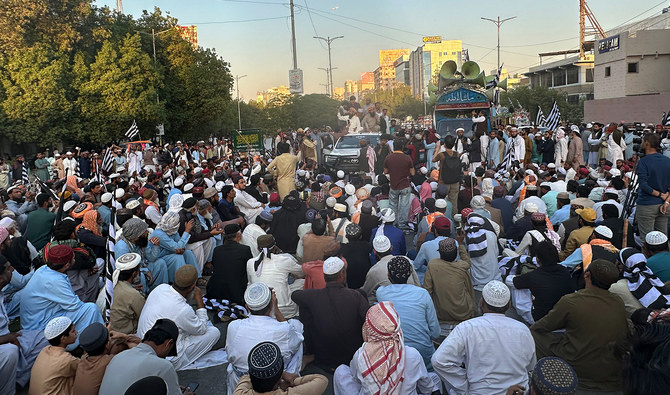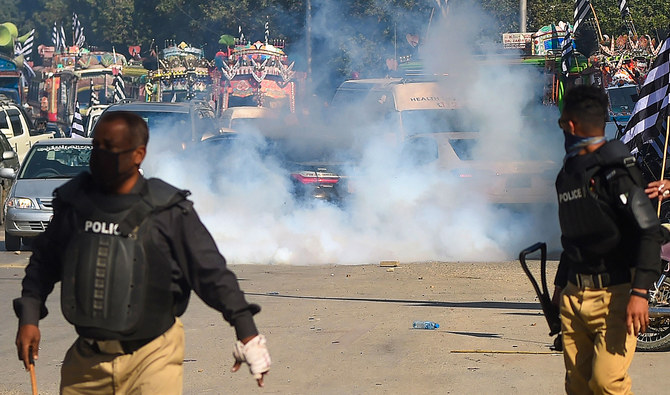KARACHI: Several Pakistani parties on Saturday announced they would observe February 27 as “black day” in response to Sindh police firing tear gas at political workers protesting suspected rigging in the general elections earlier this month, as the newly elected lawmakers joined the inaugural session of the provincial legislature.
The Pakistan Peoples Party (PPP) bagged the highest 84 seats in the southern Sindh province, followed by the Muttahida Qaumi Movement-Pakistan (MQM-P) which secured 28 seats, while 14 seats went to independents. The Jamaat-e-Islami (JI) religious party and the Grand Democratic Alliance (GDA) won two seats each.
Supporters of the JI, GDA, Jamiat Ulema-e-Islam (JUI-F), and other nationalist parties gathered near the provincial assembly in Karachi’s South zone to protest the alleged manipulation of the Feb. 8 election, which was marred by a mobile network outage and delays in the release of constituency results.
Hundreds of police personnel were deployed to prevent opposition supporters from advancing toward the Sindh Assembly building. The GDA and JUI-F were en route to the Karachi Press Club when clashes broke out between their workers and the police, resulting in stone-pelting and tear gas shelling.
“I strongly condemn the police shelling over the JUI-F workers,” Hafiz Naeem-ur-Rehman, the JI chief, said at a joint protest with the GDA. “We will observe February 27 as black day against election rigging and police torture on political workers.”
Rashid Soomro, a JUI-F leader, also confirmed development.
“Our peaceful workers were beaten and subjected to shelling as we attempted to reach the press club,” he said.
Political workers belonging to the protesting parties also blocked a main thoroughfare, Shahrah-e-Faisal, for several hours during the day.
Earlier, the outgoing speaker of the Sindh Assembly, Agha Siraj Durrani, administered oath to the newly elected lawmakers amid heavy security around the building.
“I do solemnly swear that I will bear true faith and allegiance to Pakistan, that as a member of the provincial assembly of Sindh, I will perform my functions honestly, to the best of my ability, faithfully, in accordance with the Constitution of the Islamic Republic of Pakistan, the law and the rules of the assembly, and always in the interest of sovereignty, integrity and solidarity, well-being and prosperity of Pakistan,” Durrani said as he read out the oath to the lawmakers.
“May Allah Almighty help me and guide me.”
In view of the protest calls, the Sindh caretaker government on Friday imposed a ban under Section 144 on public assembly, gatherings, protests, processions, and demonstrations in Karachi’s South zone, where the provincial legislature is located, for a period of 30 days, according to the provincial home department.
Section 144 of the Code of Criminal Procedure (CrPC) empowers the administration to issue orders in public interest and place a ban on any activity for a specific period of time.
The oath-taking ceremony came a day after the PPP nominated Murad Ali Shah, former Sindh chief minister, for the top provincial office once again, Syed Owais Shah for the role of speaker, and Anthony Naveed for the post of deputy speaker of the Sindh provincial assembly.
“We will not only compete with the governments of other provinces but also with the Center in performance,” Bilawal Bhutto-Zardari, a former foreign minister and the PPP chairman, said at a meeting of newly elected party lawmakers in Karachi.
The PPP chairman announced that his party would forge a working relationship with all opposition parties in Sindh and address their legitimate grievances, according to a PPP statement. He urged the newly elected lawmakers to play their role in resolving the people’s problems in their respective constituencies.
“Be my eyes and ears,” Bhutto-Zardari was quoted as saying. “You play the role of a bridge between the people of your constituency and me; you are my ambassador to the people.”
Opposition parties in Sindh announce ‘black day’ following clashes during provincial lawmakers’ oath ceremony
https://arab.news/p86s5
Opposition parties in Sindh announce ‘black day’ following clashes during provincial lawmakers’ oath ceremony

- Political workers of different parties staged hours-long blockade of a central thoroughfare despite tear gas shelling
- Jamaat-e-Islami, Grand Democratic Alliance and Jamiat-e-Ulama-e-Islam raised rigging allegations after Feb. 8 polls
Pakistan to participate in T20 World Cup but won’t play against India on Feb. 15

- Controversy over Pakistan’s participation erupted after ICC rejected Bangladesh’s request to relocate their matches to Sri Lanka
- Pakistan are scheduled to play all their Group A matches in Sri Lanka and open their campaign against the Netherlands on Feb. 7
ISLAMABAD: Pakistan will take part in the upcoming ICC Men’s T20 World Cup but won’t play their scheduled group stage match against arch-rival India on Feb. 15, the Pakistani government said on Sunday.
The tournament will be played from Feb. 7 to Mar. 8 and co-hosted by India and Sri Lanka, with matches being played across both countries and the final scheduled in Ahmedabad.
The controversy over Pakistan’s participation erupted after the ICC replaced Bangladesh with Scotland, following Bangladesh’s decision to not play matches in India owing to security fears.
Last week, Pakistan Cricket Board (PCB) chief Mohsin Naqvi had hinted at an outright boycott of the event in protest over the ICC’s decision to reject Bangladesh’s demands to relocate their matches from India to Sri Lanka.
“The Government of the Islamic Republic of Pakistan grants approval to the Pakistan Cricket Team to participate in the ICC World T20 2026,” read a post on the Pakistani government’s official X account.
“However, the Pakistan Cricket Team shall not take the field in the match scheduled on 15th February 2026 against India.”
Pakistan’s refusal to play against India, who they have already played at neutral venues in Sri Lanka, is likely to have severe financial implications.
Both sides have not played bilateral cricket since 2012 and only face each other in multi-nation events. Under a deal signed last year, India and Pakistan agreed not to travel to each other’s countries in cases where either hosts an ICC event, instead playing at neutral venues.
Pakistan are scheduled to play all their Group A matches in Sri Lanka. The ‘Men in Green’ will open their campaign against the Netherlands on Feb. 7.











